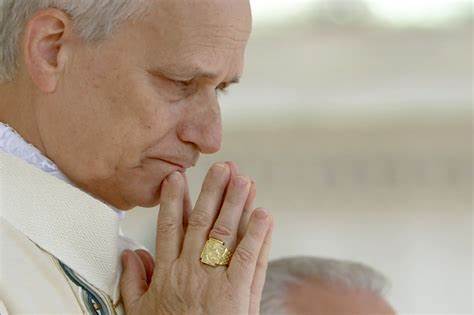My Thoughts on Pope Leo XIV’s First Homily
*The featured image for this post is Pope Leo XIV when he visited the tomb of Pope Francis.
Last week, I published a post that I was writing while watching Pope Leo XIV’s inaugural Mass at the Vatican. That post ended just before he was to begin his homily. Click here to read the transcript.
While writing last week’s post, I considered including my thoughts about the homily in the same post. However, I realized that it would be a very different matter. Such a topic merited its own post, a place where it can have its unique commentary.
These are my humble thoughts about some notable things the Pope said. For the sake of the length of this blog post, I will not comment on everything, though if there’s a matter you would like to discuss, feel free to leave a comment about it.
 Pope Leo XIV became emotional after receiving the Ring of the Fisherman.
Pope Leo XIV became emotional after receiving the Ring of the Fisherman.In the past few weeks, members of the Church have experienced many emotions. The death of Pope Francis filled our hearts with grief. In those difficult hours, we felt like the crowds that the Gospel says were “like sheep without a shepherd” (Mt 9:36).
From the beginning, Pope Leo XIV acknowledged his predecessor. I found it touching because I, like many, do miss Pope Francis. I thought often about how Pope Francis, after such a long stay in the hospital, managed to wait. He did not go to the house of the Father until after Easter. It feels as if he did this on purpose, so that we could have joy during Holy Week.
Did Pope Francis know his time was nearly up? Perhaps he had that thought in mind when giving us his final blessing.
My family and I watched this Mass, and the celebration that followed, on television. I listened to the bells ring joyously over St. Peter’s Square. They rang for a long time, a striking sound. It never crossed my mind that this would be the last time they would ring with that Pope alive.
The next time I heard those bells on television, the Pope was at peace. The grieving Church was orphaned, waiting to find out who God had in mind for the next pontiff. I wondered every day, and even then it never occurred to me that Pope Francis’ successor would be American.
 Pope Francis giving his final blessing to the faithful on Easter Sunday, 2025
Pope Francis giving his final blessing to the faithful on Easter Sunday, 2025Pope Leo acknowledged this. His words were: “we received his [Pope Francis’] final blessing and, in the light of the Resurrection, we experienced the days that followed in the certainty that the Lord never abandons his people but gathers them when they are scattered and guards them “as a shepherd guards his flock” (Jer 31:10).”
Next, Pope Leo acknowledges the importance of the faithful during a conclave, and especially their prayers. He expresses this thought poetically:
“Accompanied by your prayers, we could feel the working of the Holy Spirit, who was able to bring us into harmony, like musical instruments, so that our heartstrings could vibrate in a single melody.”
Pope Leo then expressed his hope to be a good shepherd:
“I was chosen, without any merit of my own, and now, with fear and trembling, I come to you as a brother, who desires to be the servant of your faith and your joy, walking with you on the path of God’s love, for he wants us all to be united in one family.”
Do not overlook the part where he asks for unison.
The Church has had trouble in recent years. Many opposing ideas have threatened disorder. It is truly a great promise that ‘the gates of hell will not prevail against her’ (Matt. 16:18). We should not be arguing, but prayerfully discerning the will of God—and it’s not so difficult to know this. He desires for us to love one another.
Too many people attempt to keep their faith under wraps. It is certainly valid to serve Him on one’s own, by means of personal devotions and sacrifices such as fasting. However, we cannot forget the value of living the Christian life together. We were not created to be alone.
I could not express it any better than Pope Leo did, in this striking statement:
“Love and unity: These are the two dimensions of the mission entrusted to Peter by Jesus.”
Love and unity. God desires for us to love, even when it seems like we can’t. We are encouraged to listen to one another with patience and compassion. All humans, even those who have strayed, were created by God.
As the late Pope Benedict XVI stated:
“Each of us is the result of a thought of God. Each of us is willed, each of us is loved, each of us is necessary.”
We sometimes have the idea that love is passive and cannot bring about great change. This is simply untrue. True love is not passive. Love can require great effort. It asks us to put aside our prejudices. It moves us to offer gifts—even immaterial gifts, like time and a kind word—to individuals that we don’t think deserve them.
Love improves us, and even if it does not happen immediately, the person being loved does benefit from it. Why? Because God is love. God is not passive. We cannot always see Him, but He never tires of loving us. We should strive to imitate Him in doing the same.
The homily urges us to go forth and spread the Good News. Another poignant phrase from Pope Leo XIV calls for unity:
“Brothers and sisters, I would like that our first great desire be for a united Church, a sign of unity and communion, which becomes a leaven for a reconciled world.”
What does this mean? It’s impossible to ignore that, due to various reasons, some Catholics have been arguing amongst themselves. Rather than spreading the Gospel, they try to one-up each other. It is a bad look for outsiders who might be interested in the Church. If we do not show love for each other, how can we compel a possible convert to come near?
The human soul seeks peace in the arms of God. I can understand why many would avoid a place of worship where strife exists.
Rather than being unkind to converts, we should welcome them and share the faith we love. Rather than obsessing over types of Mass (I consider the Novus Ordo and Latin to both be valid), we should be thankful people are compelled to attend. It’s human to have preferences, but I’ve encountered too many people who sneer at one form or the other.
Rather than initiating arguments, should we not take time to learn what the other party believes? As stated in my previous post, I’ve learned much about God by conversing with people who don’t worship in the same way I do. Through their help, I have come to enjoy a closer relationship than ever with the Lord.
Let’s focus our energy on becoming fishers of men. Cliquish behavior does not call to the broken. Only love can lure the shattered, for love is the greatest of balms. Love is Christ; love saves.
I believe our new Pope understands this. It is very similar to what Pope Francis called for. Pope Francis’ words were often taken out of context. I dare say that his message was the same: We must love one another like Christ loved us (John 13:34-35).
This month, Google searches for ‘how to become Catholic’ have begun to rise. I challenge you to educate yourself about your faith. Be prepared to answer questions, as they will surely come.
During this pontificate, there is a high likelihood that you will meet people with questions. We should be prepared to give reasons for our faith. Let us be warm and welcoming to the people making those Google searches.
It is time to be unified again. It is time to rethink what it means to do things as Christ did, with love.
Did something in particular strike you about Pope Leo XIV’s homily? I would love to hear from you!



